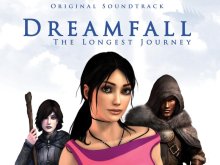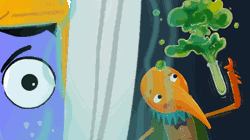- Interviews
- Leon Willett (Englisch)
Interviews
Leon Willett (Englisch)
Gesprächspartner: Luc 'LGH' Gilbertz
Sprache: 
Vom:
20.07.2006
Über
Leon Willett composed the soundtrack of Dreamfall and currently works on a Dreamfall medley for the opening concert of the Games Convention in Germany. Information about his work can be found on leonwillett.com, the Dreamfall soundtrack is available at iTunes Music Store.
Adventure-Treff: "Hello, could you briefly introduce yourself? What were some of your favourite projects and what are you currently working on?"
Leon Willett: "My name's Leon Willett; I was born in Edinburgh, Scotland and now I live in Barcelona, Spain. I moved back here after studying music composition at Salford University. I worked on a couple of small indy projects before I teamed up with Funcom last year to work on Dreamfall - The Longest Journey. Now I'm working on an unannounced project that I'm really excited about (and I'm sorry I'm unable to provide any details!), aswell as my in-progress score for Lost Eden, which is the latest episode in the award-winning series, Anarchy Online."
A-T: "How did you end up being a professional composer?"
L.W.: "Well, my first paying projects were very small things coming out of the Barcelona Film school. Despite having decent budgets and good production values none of those projects went anywhere, and I was also working as a copyist for some time. It was really only when I started working for Funcom that I was able to dedicate myself 100% to composing."
A-T: "Do you have some music idols, both in general and regarding game soundtracks?"
L.W.: "Yes I have quite a few idols! In concert music, Debussy, Stravinsky and Bartok are my three clear favourites. In film music John Williams is a huge idol for me, and I've also taken apart a fair amount of Jerry Goldsmith and James Newton Howard. In games I have a lot of respect for the work of Jeremy Soule, Bill Brown and, of course, Nobuo Uematsu."
A-T: "When composing music, do you rather sit there with pen and paper, on the piano or on a computer?"
L.W.: "I always compose on paper. I used to compose on a full orchestral template, but due to time constraints I now use a very detailed 12-stave short-score, which basically contains all the information you'd find in a long score, but abbreviated. So you may find a line that says 2ob+2bn(8vb), which means that two oboes play that line, with two bassoons doubling an octave below."
A-T: "How did you manage to capture the mood in Dreamfall so well? Did you see a lot of the game before writing the music, or was it mostly based on descriptive texts and art sketches."
L.W.: "Actually, I had a build of the game to work from, which was updated continually as more parts of the game were completed. So I got to play the scenes that needed music--which was perfect! I also had a copy of the script, lots of concept art, and of course actual direction. I took direction mainly from Morten Sorlie, the Audio Director, but also from Simon Pool, and Ragnar Tornquist--who wrote and directed the game."
A-T: "How much influence did the music of the original The Longest Journey have on the soundtrack of Dreamfall?"
L.W.: "My score for Dreamfall took a fairly new direction, in accordance with the new production style and hybrid gameplay. The intimate eclecticism that worked so well in the first game would have been a little awkward in the midst of such all-out fantasy, which was inter-mixed with a broad urban thriller. I felt the hugeness of the plot and the visuals really called for a much more Hollywood, filmy approach."

A-T: "How much direction did you get from Ragnar Tornquist during the composing process? Did he just describe you the general mood of the scene, or did he also have precise ideas concerning the musical style?"
L.W.: "I held very detailed spotting sessions with Ragnar and Morten at the beginning of the project, where we actually went through every part of the story from start to finish. Then, as the work unfolded I took direction from Ragnar, Morten and Simon--depending on who was working on what scene at the time. When the music was implemented we got feedback from Ragnar on how it was working, and if any changes were needed. Ragnar did sometimes have requests for specific styles, like how ethnic the city of Sadir needed to feel, and that the training scene in Sadir should be scored with percussion only. Other times, he had no specific request except that the music express this or that emotion."
A-T: "The music in Dreamfall has a very high sound quality. Were there live recordings with some instrumentalists or even a whole orchestra?"
L.W.: "Actually, we considered using a live orchestra but were ultimately unable to go down that road. My long scores were simulated using a state-of-the-art collection of commercial and custom samples. Now, we're all elated that I've been approached to compose a Dreamfall medley to be performed by the Prague FILMharmonic under the baton of Andy Brick, at the GC concert this August. I hope to record my scores with live orchestras in the future, because honestly there is no comparison with what you can do with even the best samples!"
A-T: "Have you also composed the music for the few vocal tracks that are used in the game, e.g. in the end credits? How did you manage to preserve the coherence between the pure orchestral music and the vocal numbers?"
L.W.: "Actually, only one of the vocal tunes I wrote--that's the one we hear in the hospital scene, where Zoë is in a coma. Ingvild Hasund composed the tune you hear at the end, and other songs in the game were contributed by Norwegian artist Magnet."
A-T: "Have you ever played the final game when it was shipped? If so, how did it feel to hear your work inside the worlds of Stark and Arcadia?"
L.W.: "I have indeed played through the game, and I'm very excited at how it turned out! I think the whole team can be really proud to have worked on a title with such an amazing story, visuals and sound. It's not often that a game is released which is a significant contribution to a genre."
A-T: "What can you tell us about the process of turning the piece from the game into a version for a complete orchestra?"
L.W.: "I'm working on it right now! It will be pretty amazing to finally hear it in Leipzig!"
A-T: "Any funny behind the scenes anecdote?"
L.W.: "I sent Morten a very serious email once saying that I had composed a special B-section to the Kian theme, that was a bit experimental, and I wanted his opinion on it. When he sat down to listen to my creation he was greeted with a disco remix of ABBA's Gimme a Man After Midnight where the huge reprise of the kian theme should have been. It was in the same key and tempo, too, just carefully mixed in halfway through! Mysteriously, I was never paid for that submission..."
A-T: "Thank you for the interview. and for the fantastic atmosphere you added to Dreamfall!"
L.W.: "Thanks for your questions, and I'm glad you enjoyed the score!"
Aktuelle Artikel
![]()
Unterstützen
![]()
Adventure-Treff-Verein
IBAN: DE38 8306 5408 0004 7212 25
BIC: GENODEF1SLR
Bitte beachtet, dass wir leider keine steuerrechtlich anrechenbare Spendenquittungen ausstellen können.
Mit jedem Einkauf bei unseren Partnern unterstützt ihr die Arbeit des Adventure-Treff e.V.












